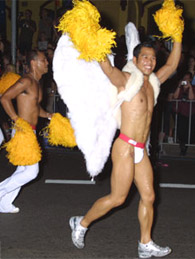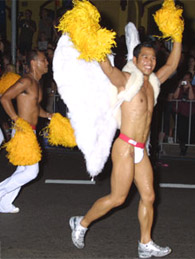Each year around March, I always find myself having the same conversation with the same friend. You'd think we'd be sick of it by now.

"Oh? Going somewhere?" I asked him.
He gave me a withering look. "It's the Oscars, you ninny!"
"So?"
"Are you really SURE you're gay?"
And we went on to bicker comfortably over familiar ground, which was about why my sexual orientation isn't defined by my lack of adulation for the Oscars, my lack of fashion sense, or inability to have a good hair day. Ironic, if you think about it. I was staunchly asserting my right to be gay, when so many men in this city take drastic pains to hide the Barbra Streisand lover within them. But then, I hang around with a group of people who are proud to be gay, deeply happy to be gay, and who, in fact, immensely enjoy the lifestyle that comes with being gay.
What determines the extent of a person's "gay-hood"? My friend believes that being gay is a whole lifestyle concept. For him, to paraphrase a line from To Wong Foo with Love, a boy who sucks cock isn't necessarily gay. He's just a boy who sucks cock. My friend insists that being gay isn't just about sex. It should embrace and encompass the attitudes, ideals and utter fluffiness that comes with telling yourself you're fabulous. The freedom of self-expression, the delight in campyness, the casual skill in dissing everybody sitting two tables away from you, the ability to reduce everything to its most basic, humorous elements. Any less, and you're just a boy whoģ lipsynchs to Madonna.
I felt that his argument was unnecessarily complicated, that in fact the reality was much simpler. For me, being gay is both a sexual orientation and a lifestyle. By it's sheer nature, being gay defies definition - and constraints. At its ultimate, deepest core, it's founded on a very physical attraction for someone of the same-sex. My friend insists that being homosexual isn't the same as being gay. But I'm always quick to point out that they're not inherently related. Only a man who's fully accepted the idea that he has a feminine side can embrace the fluffiness that comes with the gay lifestyle. No matter how you phrase it, or what names you coin, if you're a guy who gets a stiffie over other guys, you're gay. One yahoo group I know of insists on the term "discreet masculine" for themselves, shunning the word "gay" with scorn and hostility. But more on that in my next column.
For me, I believe that "gayhood" has its stages, just like everything else. The moment of acceptance, when you tell yourself "I like boys" is much akin to the moment of birth. All the rest - knowing the words to every Broadway musical in existence, whipping up table decorations to make Martha Stewart proud, owning a closet of Prada, these are all part of the "growing up." It depends on the individual how far, and in what direction he is willing to grow.

Who's to say that any of them are less gay than the rest?
The danger we often fall into is deciding that our definition for a thing is the ONLY correct definition. Common practice - and acceptance - has made "camp" the standard for gayness. But it doesn't mean that the other lifestyle patterns are invalid - a drag queen or a closet case are both acting according to what they perceive as proper for them. It's their lifestyle choice. Who's to say which is better?
Ultimately, if you dig through the layers of glitter, leather, feathers and fluff, you may find that our essential natures are the same. The inner sensitivity and compassion, the yearning for acceptance, the strength of character that allowed us to grow up in a straight world and remain sane, the true appreciation of fun and wit, the outrageous sense of independence - it is these things and more, that make us what we are. Sadly, I see this realisation as also part of the "growing up", and many of us never quite get there.
In the end, my friend and I didn't really come to a conclusion - meaning that we will likely be having the same argument next year, again, to no seeming conclusion. But then again, isn't stubbornness also part of what makes us gay?
